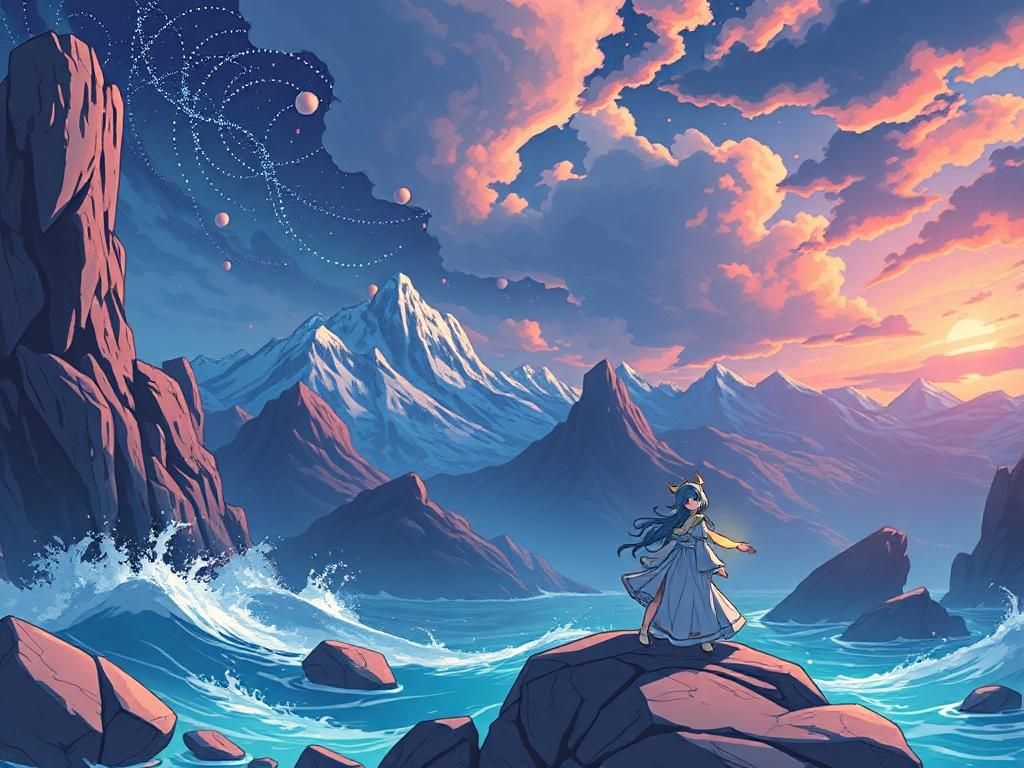Olympus Scanlation is a vibrant part of the global scanlation community, representing the dedication and passion of fans who bring manga and manhwa to readers outside of Japan and Korea. Scanlation, a portmanteau of “scan” and “translation,” refers to the process of digitizing and translating comics for audiences who might not have access to these works in their native languages. Over the years, fan communities have grown, largely due to the increasing accessibility of these digital translations, which have allowed non-Japanese readers to explore and enjoy the rich world of manga and manhwa.
The significance of scanlation cannot be overstated. By providing translations of works that are often unavailable through official channels, scanlation groups facilitate access to diverse narratives and cultural nuances. These efforts not only preserve the original content but also spark interest in the creators and encourage readers to seek out purchases of the official versions, thus supporting the industry.
Overview of Olympus Scanlation
History and Origins
Olympus Scanlation was founded in the early 2000s, springing from a group of enthusiastic fans who wanted to share their love for lesser-known series. Among the founding members were talented translators, editors, and artists who recognized the need for better availability of translated content. As the community grew, Olympus Scanlation evolved in its focus, emphasizing quality translations and reaching out to original creators.
Initially, Olympus Scanlation began with individual projects that included various genres and styles. Over time, the group streamlined its efforts toward selecting unique titles that had not yet gained popularity in the English-speaking market. This dedication has resulted in a diverse library of works and heightened interest in lesser-known series.
Mission and Objectives
The primary mission of Olympus Scanlation focuses on creating a bridge between original manga and its international audience. By promoting lesser-known series, Olympus Scanlation introduces fresh narratives to fans. They strive to provide high-quality translations that retain the essence and cultural nuances of the original content, fostering an authentic experience for readers. Engaging with the fan community is also a core objective, as they value feedback and actively encourage discussions around their projects.
Process of Scanlation at Olympus
Workflow Breakdown
The process of scanlation at Olympus involves several key stages, each meticulously executed to ensure the highest possible quality. First, the original material is scanned, ensuring that all visuals are clear and preserve artwork integrity. Next, the translation process begins, with translators referring to both literal translations and localized interpretations to convey the intended message accurately.
Once the translation is complete, skilled editors refine the text. They focus on punctuation, grammar, and style, adhering to the tone of the original work. Following this, typesetting takes place, where the translated text is integrated into the visuals, a crucial step to ensure a seamless reading experience.
Tools and Software Used
Olympus Scanlation relies on various tools to facilitate their workflow. Scanning software like VueScan is essential for digitizing the source material with high quality and accuracy. For translation, many team members use a combination of Google Translate and specialized translation memory software to ensure consistency in language and terminology.
In terms of image editing, Adobe Photoshop and GIMP are widely used for manipulating images, typesetting text back into the panels, and ensuring that the final product is visually appealing.
Types of Content Translated by Olympus Scanlation
Genres and Categories
Olympus Scanlation covers a wide range of genres, including:
– Shonen – Typically aimed at younger male readers, featuring action-packed plots.
– Shojo – Targeted toward young female audiences, focusing on romance and character-driven stories.
– Seinen – Intended for adult male readers, often delving into complex themes.
– Josei – Geared toward adult female readers, exploring realistic narratives and relationship dynamics.

The group also delves into less traditional formats such as webtoons and light novels, expanding the variety of content available to non-Japanese readers.
Notable Titles and Projects
Some notable titles that Olympus Scanlation has translated include popular series that may not yet be widely recognized outside their native markets. Projects such as “Kimi ni Todoke” and “The King’s Avatar” illustrate Olympus Scanlation’s commitment to bringing diverse content to the forefront. Collaborations with original creators and smaller publishers have also bolstered their reputation within the scanlation community.
Community Engagement and Contribution
Reader Involvement
Engagement with readers is a crucial aspect of Olympus Scanlation’s identity. They actively gather feedback through forums and social media channels, creating a space for fans to discuss upcoming projects and share their thoughts on translations. Volunteer opportunities are frequently offered, allowing fans to contribute to the scanlation process, from translation to editing.
Events and Collaborations
Olympus Scanlation’s commitment to community extends to participation in conventions and expos related to manga culture. They collaborate with fellow scanlation groups and independent creators to foster a more inclusive environment within the manga community. Support programs and commissions are also a way for fans to engage with and support Olympus Scanlation’s ongoing projects.
Challenges Faced by Olympus Scanlation
Legal Issues
One of the significant challenges faced by Olympus Scanlation revolves around legal concerns such as copyright infringement. They navigate complex relationships with publishers and authors in an attempt to balance fan engagement and the legal ramifications of scanlation. Working to maintain transparency and goodwill with the community is essential to their operations.
Quality Control
Quality control is another pressing challenge. Olympus Scanlation strives to balance speed versus quality in translations, as discrepancies can lead to discontent among fans. With the vast array of content being translated, inconsistencies can arise, requiring meticulous attention to detail and continuous improvement within their processes.
Community Dynamics
Navigating diverse opinions within the fanbase is an ongoing challenge. Managing various viewpoints while fostering an inclusive environment is crucial, particularly when discussions of gatekeeping arise. Olympus Scanlation places a premium on inclusiveness, encouraging a welcoming atmosphere for all fans, regardless of their familiarity with scanlation.
Impact of Olympus Scanlation on the Manga Community
Role in Fostering New Talent
Olympus Scanlation has played a significant role in discovering new artists and authors, showcasing their work to a broader audience. Through their platform, emerging translators and editors can enhance their skills and find opportunities within the manga industry, exemplifying a valuable pathway for new talent.

Influence on Mainstream Manga Access
The influence of Olympus Scanlation on the broader manga community is noteworthy. Their translations contribute to an increase in manga sales and readership growth, illustrating the impact of fan engagement on official publishing routes. Moreover, interactions with official English publishers allow Olympus Scanlation to bridge the gap between fan translations and professional localization efforts.
Future of Olympus Scanlation
Trends in Scanlation
The future of Olympus Scanlation will likely reflect broader trends within the scanlation community. Many groups are increasingly shifting toward digital platforms and adapting to webtoon formats that cater to a new generation of readers. Collaborating with official channels become more common, blending fan translations with professional practices.
Vision and Goals for the Next Decade
For the next decade, Olympus Scanlation aims to expand its portfolio of translated works significantly. Their vision includes advocating for copyright changes within the scanlation sphere, fostering a more symbiotic relationship between fan translations and official publishers.
| Key Aspects | Description |
|---|---|
| Foundation | Established in the early 2000s by passionate fans. |
| Genres | Shonen, Shojo, Seinen, Josei, Webtoons, Light Novels. |
| Mission | Promote lesser-known series and provide quality translations. |
| Community Engagement | Regular feedback, recruitment efforts, and convention participation. |
| Challenges | Legal issues, quality control, and community dynamics. |
| Future Goals | Expand translated portfolio and advocate for copyright changes. |
Conclusion
Olympus Scanlation plays a vital role in the manga community by serving as a bridge between original creators and an international audience. Their dedication to quality translations and community engagement fosters a supportive environment for both creators and fans. As the landscape of scanlation continues to evolve, readers are encouraged to support both fan-made translations and official releases, ensuring the growth and sustainability of the manga industry.
Frequently Asked Questions
What is Olympus Scanlation?
Olympus Scanlation is a fan-based group dedicated to translating manga and manhwa for non-Japanese readers.
How do scanlation groups operate legally?
Scanlation groups navigate legal issues by maintaining transparency and seeking collaboration with original creators and publishers when possible.
Why are translations by Olympus Scanlation important?
They offer access to lesser-known series, preserve cultural content, and foster interest in original works.
What genres does Olympus Scanlation focus on?
Olympus Scanlation translates a range of genres including shonen, shojo, seinen, josei, as well as webtoons and light novels.
How can readers get involved with Olympus Scanlation?
Readers can engage with Olympus Scanlation through feedback channels, volunteering opportunities, and by participating in community events.
What challenges does Olympus Scanlation face?
Challenges include legal issues, managing quality control, and navigating community dynamics.
What impact does Olympus Scanlation have on the manga community?
The group helps increase manga readership and sales, while fostering new talent in the industry.
What is the future vision for Olympus Scanlation?
The aim is to expand their portfolio of translated works and advocate for more favorable copyright conditions within the scanlation landscape.
Why should readers support both fan and official translations?
Supporting both allows for a vibrant industry that fosters creativity and provides a broad range of content for fans to enjoy.
How does Olympus Scanlation select projects for translation?
Projects are chosen based on uniqueness and the potential to engage new readers, with an emphasis on lesser-known series.

